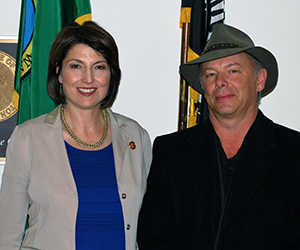By Joanna Steward, College of Arts and Sciences
 WASHINGTON – A simple mistake during an experiment into endocrine disruptors – chemicals known to interfere with fetal development – dramatically changed the direction of inquiry for one Washington State University researcher and led him to challenge the core biological principals of genetic inheritance.
WASHINGTON – A simple mistake during an experiment into endocrine disruptors – chemicals known to interfere with fetal development – dramatically changed the direction of inquiry for one Washington State University researcher and led him to challenge the core biological principals of genetic inheritance.
Michael Skinner, professor of biological sciences, was honored this week with an American Ingenuity Award from Smithsonian Magazine for his pioneering work in the field of transgenerational epigenetics: the study of inherited changes that can’t be explained by traditional genetics.
Nobel Prize winner in physiology Carol Greider presented Skinner with the award during a gala at the National Portrait Gallery in Washington, D.C., on Tuesday evening.
A novel concept
Modern biologists know that DNA controls the inheritance process and that mutations in the sequence are how changes in biology from parent to child are transmitted.

/sfphotoworks)
Skinner and his colleagues discovered that exposure to toxic substances during pregnancy can cause molecules called methyl groups to latch on to the fetal DNA in rats. Like burrs stuck to a sweater, these extra molecules are passed along from generation to generation and are linked to increased disease and abnormalities for more than three generations.
“In essence,” Skinner explained, “what your great-grandmother was exposed to could cause disease in you and your grandchildren.”
In recent years, the Skinner lab (http://skinner.wsu.edu/) has documented epigenetic effects from a host of environmental toxicants, including plastics, pesticides, fungicides, dioxins, hydrocarbons and the plasticizer bisphenol-A or BPA.
Researchers determined each chemical exposure produces a distinct methyl group pattern that persists in the great-grandchildren of exposed rats and appears to be connected to specific diseases such as ovarian cancer and kidney disease. In October, Skinner and his colleagues published a paper in PLOS One linking exposure of DDT to obesity in future generations.
Although it’s not likely the methyl groups can be fixed, Skinner said, simply knowing they exist may provide opportunity for novel diagnostics and therapeutics. In the future it may be possible to get an epigenetic diagnosis and then with specific lifestyle changes and therapies prevent certain diseases from developing.
“Michael’s research is a wonderful example of the power of science to open new windows on how the world works,” said Larry Hufford, director of the WSU School of Biological Sciences (http://sbs.wsu.edu/index1.html). “His insights into inheritance and disease susceptibilities will help us better understand the consequences of chemicals in our environment.”
Risk-taking reward
The Smithsonian awards honor “innovators who are revolutionizing their fields with recent, high-impact achievements,” says Smithsonian magazine editor-in-chief Michael Caruso. “While their work is different in objective, each winner is embracing the Smithsonian’s mission to increase knowledge and shape the world of tomorrow.”
In all, nine groundbreaking individuals were recognized across categories including technology, performing and visual arts, natural and physical sciences, education, historical scholarship, social progress and youth achievement were recognized by the organization.
Skinner and his fellow awardees are profiled on the Smithsonian Magazine website (http://www.smithsonianmag.com/ideas-innovations/The-Toxins-That-Affected-Your-Great-Grandparents-Could-Be-In-Your-Genes-231152741.html). They will be featured in the December print issue of the magazine on stands next week and are the subject of “Genius in America,” a television documentary scheduled to premiere tonight on the Smithsonian Channel (http://www.smithsonianchannel.com/sc/web/show/3395004/genius-in-america).

Skinner was accompanied at the gala by his wife, son, daughter and parents. While in Washington, he also met with U.S. Rep. Cathy McMorris Rodgers from Washington state and members of the WSU federal relations staff.
Find related stories about Skinner’s research at:
and
Contacts:
Michael Skinner, WSU professor of biology, skinner@wsu.edu, 509-335-1524
Eric Sorensen, WSU News, eric.sorensen@wsu.edu, 509-335-4846